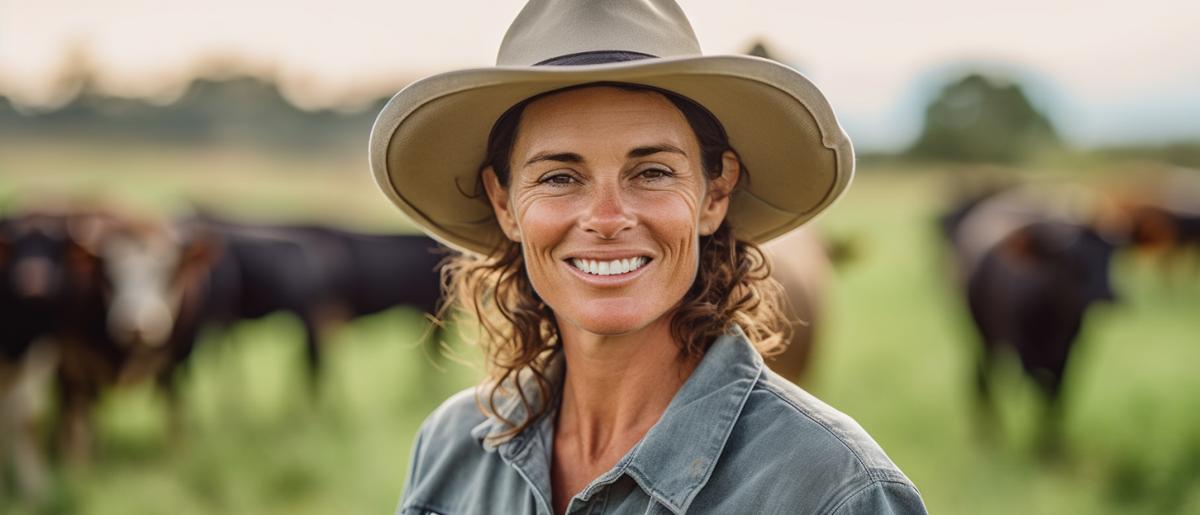

In the thriving and competitive Australian dairy industry, business loans emerge as a vital lifeline for success. Financing is typically the backbone of any business venture, and dairy producers are no exception. Access to capital can facilitate various growth opportunities, from improving infrastructure to investing in the most modern equipment. However, the dairy sector is inherently laden with unpredictability. Market volatility coupled with the unpredictability of environmental conditions amplifies financial strain, making access to funds a necessity rather than an option. Business loans can help dairy producers navigate these challenges, providing the financial cushion required to weather uncertain times. Beyond survival, business loans can propel dairy producers towards expansion. With access to funds, producers can scale operations, introduce innovative products, or break into new markets—giving them a competitive edge in an industry where the stakes are high. To put it simply, business loans provide the financial support to not only sustain dairy businesses but also help them grow and prosper. Offering both stability and growth prospects, they are an essential aspect of dairy production in Australia.
Compare over 50+ lenders with one application.
Dairy production has consistently shaped the economic and regional landscape of Australia. A cornerstone of the national agriculture industry, dairy producers play an integral role in nourishing the country's inhabitants. Milk, cheese, yoghurt and other dairy goods are staples in Australian households, making dairy producers instrumental in fortifying the Australian diet with essential nutrients. Alongside providing essential sustenance, the dairy industry contributes significantly to the economy of Australia. Responsible for thousands of jobs directly and indirectly, from regional communities to bustling cities, one can find the echoes of the dairy industry. Producers are often the lifeblood of local economies, particularly in rural areas where dairy farms are ubiquitous. Further, dairy producers have a pioneering role in maintaining Australia's biodiversity. Attention to the health of their herds invariably necessitates sustainable farm management practises, leading to the preservation of soil quality, water resources, and natural habitats. Yet, this is more than just an industry. It's about heritage, tradition, and a way of life passed down through generations. The dairy producers not only contribute to the economy but also form a vibrant part of Australia's social and cultural fabric. Their resilience, innovation, and commitment to delivering high-quality products are symbolic of the Australian spirit. As such, the importance of dairy producers extends far beyond milk production, touching every corner of the Australian society—economic, environmental, and cultural, thus weaving a narrative that's intrinsically Australian.
Learn about eligibility and how to apply.
Dairy production is a significant sector in the Australian economy, but it's not without its share of challenges. Rising input costs is a key concern. The prices of essential items such as feed, energy, and water have been increasing over the years, directly affecting profit margins. These costs can spike unpredictably due to weather conditions or global markets, making budgeting a complex task for farmers. Climate change exacerbates these issues by bringing unpredictability in weather patterns, which can affect both the quality and quantity of feed. Unexpected changes in temperature and rainfall can also lead to increased incidences of diseases and pests, affecting cow health and milk production. At the same time, dairy producers must navigate a fluctuating milk market. The price of milk fluctuates due to global supply and demand dynamics, making income unstable. The power of supermarkets to dictate milk prices due to their sheer size also adds to the difficulty. In addition to these, compliance with strict quality and environmental standards can prove costly. Regulations are necessary for maintaining a sustainable and safe industry, but meeting these requirements often involves hefty investments in infrastructure and technology. Given these obstacles, the capital constraints of running a dairy farm become evident. Without substantial financial support, overcoming such hurdles can become formidably challenging, highlighting the importance of accessible and flexible business loans. Such financial instruments can act as essential buffers, providing dairy producers with the necessary liquidity to manage these challenges and sustain their operations, even in trying times.
Calculate your repayment estimates and more.
In the dynamic environment of dairy production, access to suitable financial support can lead to marked improvements in business operations. Business loans for dairy producers are not just about overcoming challenges; they're an avenue to capitalise on opportunities, to innovate and to grow. Such financial solutions offer flexibility and are designed to cater to the unique demands of dairy farming, which can mean everything from facility enhancements and acquisition of equipment, to investment in improved breeding stock and advanced technologies, amongst other improvements. Fundamentally, these loans provide dairy producers with a valuable financial buffer allowing for more effective management of cash flow. Dairy producers often face variability in revenue due to fluctuating market prices, seasonal changes or unanticipated occurrences such as drought or disease. A business loan can act as a stabilising factor, bridging gaps in revenue and ensuring continued operations in lean periods, effectively turning financial unpredictability from a liability into a manageable factor of business operations. Lastly, business loans give dairy producers the ability to plan and implement long-term strategies. This forward-looking advantage means that a dairy farm can confidently invest in initiatives or advancements that, while initially costly, would provide major efficiency benefits and profitability increases in the long run. Whether that involves expanding into new markets, modernising farming practises or speeding up delivery through better processing equipment, a business loan helps make these aspirations achievable. This injects potential into a dairy producer's business journey, providing a solid groundwork to fuel success, profitability, and sustainability.
Dairy Producers in Australia have business loan options such as working capital loans, equipment finance, and commercial property loans. Working capital loans offer a financial cushion for daily operations, equipment finance assists in upgrading and maintaining farming equipment, and commercial property loans are ideal for expanding farmland or developing existing properties.
There are several types of business loans in Australia that can benefit Dairy Producers. Each of these loan types has its unique features, advantages, and potential disadvantages. Here are some of the most common types of business loans for Dairy Producers:
Working Capital Loans
These are short-term loans designed to meet the day-to-day operations of your dairy farm. They can cover expenses such as feed, labour costs, veterinary fees, or maintenance costs.
Equipment Loans
This type of business loan can help dairy farmers purchase vital machinery such as milking machines, cooling systems, and tractors. They usually have lower interest rates, and the purchased equipment serves as collateral for the loan.
Livestock Financing
Livestock loans are tailored to help farmers increase their herd or to manage costs associated with livestock healthcare. These loans are suitable if you need to purchase cows for milk production.
Supplier or Invoice Finance
If you're dealing with long-term customers who take time to pay, supplier finance can bridge the gap. It provides an advance of the funds tied up in your outstanding invoices.
Lines of Credit
This is a flexible financing option where you gain access to a specific sum of money and only pay interest on the amount that you borrow. A line of credit can be useful for handling unexpected expenses or seizing growth opportunities.
Overdraft Facilities
Similar to lines of credit, an overdraft is linked to your bank account and allows you to draw more than your available balance to a certain limit. This can be helpful for managing fluctuations in cash flow due to seasonal dairy farming patterns.
Commercial Property Loan
If you're looking to expand your operation with additional land or facilities, a commercial property loan could be a suitable option.
Vehicle Finance
A specific type of equipment loan, vehicle finance aids in purchasing or upgrading vehicles needed for transport and logistics.
Green Loans
As sustainability becomes a more prominent concern, green loans are available for dairy farmers who want to implement environmentally friendly practises on their farm, such as instaling solar panels or energy-efficient equipment.
Farm Management Deposits (FMDs)
While technically not a loan, FMDs are a useful way for farmers to manage their risks in years of fluctuation in income, due to changes in weather or milk prices. This financial scheme allows farmers to make tax-deductible deposits in good years, which can be withdrawn in leaner years.
Dairy Producers in Australia could effectively use business loans to bolster infrastructure, modernise equipment for improved milk processing, or enhance marketing strategies to reach wider consumer markets. These investments can help them bolster production capacities and stay competitive in the rapidly evolving dairy industry.
Here are some common reasons Dairy Producers use business loans:
Equipment Upgrades
Updating outdated machinery is a key use of business loans by dairy producers. Improved equipment can increase productivity and efficiency on the farm, reducing maintenance costs and downtime due to breakdowns.
Automation Tools
To stay competitive in the dairy industry, many dairy producers are turning to automation. Business loans provide the necessary funding to invest in robotic milking systems and other automated equipment for efficient operations.
Property Expansion
Business loans allow dairy producers to expand their farmland or facilities. The ability to house more livestock or increase production capacity can translate directly into increased business growth.
Product Innovation
Business loans enable dairy producers to invest in new product development. This could include funding for research and development of niche dairy products to carve out a unique space in the market.
Staff Training
Furthering the skills and knowledge of employees is another common use for business loans. With a trained workforce, dairy producers can improve productivity and maintain high standards of product quality.
Marketing and Branding
Funds can be used to improve marketing and branding efforts. By promoting their products and building a strong brand, dairy producers can have a solid positioning in the market.
Infrastructure Maintenance
Regular upkeep of barns, fences, and other farm infrastructure is essential for a smooth operation. A business loan can provide the necessary funding for these maintenance tasks.
Sustainability Initiatives
Increasingly, dairy producers are focusing on environmentally friendly practises. Business loans can aid in the investment in renewable energy sources or waste management systems.
Cash Flow Management
Dairy producers often use business loans to manage cash flow, especially during off-peak seasons. Having extra available capital can assist in covering operational expenses and ensuring business continuity.
Emergency Fund
Unexpected events happen. Whether it's equipment failure, a sudden slump in the market, or adverse weather condition, having a buffer fund from a business loan can prove invaluable.
To estimate your monthly repayments and the total cost of the loan, input the loan amount, loan term and interest rate into the calculator below. This helps you plan your budget and choose the most suitable loan terms.
These helpful FAQs will help you find the answers you need. If you can't find what you're looking for, you can request a callback below.